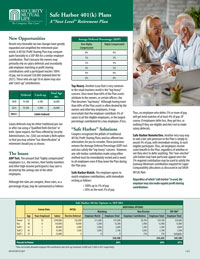A traditional 401(k) plan is generally not favorable to “highly compensated employees” (owners, their immediate family members, and those who earned more than $130,000 in 2020). The employee deferrals usually require testing to ensure the plan is non-discriminatory. This testing links the deferrals of those who are considered highly compensated employees with those who are not. In most cases this testing severely limits the amounts the highly compensated employees may defer.
The solution to the problem is called a “Safe Harbor.” By promising a certain guaranteed employer contribution each year to the plan participants, the plan is exempt from testing employee deferrals. This exemption allows all participants the option to defer the maximum allowable amount.
The guaranteed employer contribution is 3% of pay or a match of up to 4% of pay.
Who is a Safe Harbor 401(k) plan right for?
- Small-to medium-sized businesses where the owners or management wish to save for retirement but are concerned about the cost effectiveness of the plan.
- Businesses whose “highly compensated employees” wish to make substantial 401(k) deferrals.
Another example of a Safe Harbor 401(k) is the “DASH” plan. This combines the benefits of the Safe Harbor 401(k) feature with a New Comparability Profit Sharing Plan.

